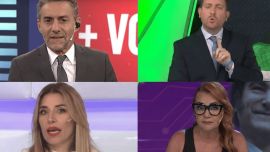Venezuela and the jewell of its oil-dependent economy, PDVSA, were declared to be in partial default by ratings agencies Tuesday, while creditors meeting in New York put off a decision that could spark a run on the state oil company's assets.
Standard & Poor’s declared Venezuela in "selective default" after it failed to make US$200 million in payments on two global bond issues by the end of a 30-day grace period on November 12. Fitch meanwhile placed PDVSA in selective default for a week's delay in the payment of two bonds totalling some US $2 billion, which matured November 2 and October 27.
A committee of 15 financial firms representing creditors met in New York "to discuss whether a ‘Failure to Pay Credit’ Event had occurred" with respect to PDVSA. They ended up postponing a decision for a third consecutive day and will reconvene Thursday to determine whether holders of PDVSA debt with default insurance – credit default swaps – can collect payment.
PDVSA is vulnerable to creditors potentially moving to seize crude shipments or refinery assets abroad, particularly from its US subsidiary Citgo.
If a selective default spreads to other bond issues, in particular the nation's US$150-billion sovereign debt, the South American country would likely be declared in full default.
Full default
A full default – recognition that Venezuela is unable to repay its massive debt – would have enormous consequences for the country whose population is already suffering severe food and medicine shortages because of a lack of money to import them.
The ratings agencies' move came after Vice-President Tareck El Aissami met with creditors in Caracas Monday, but offered no way out of the impasse.
In the meantime, China said its massive financing of Venezuela was "proceeding normally", and Russia was expected to sign an agreement as early as Wednesday to restructure US$3 billion of Caracas' debt, according to sources in Moscow familiar with the matter.
Beijing and Moscow have emerged as Venezuela's most reliable sources of funding, with China owed US$28 billion and Russia US$8 billion.
S&P said it had lowered two Venezuelan bond issue ratings to "D" (default), and lowered the long-term foreign currency sovereign credit rating to "SD" (selective default)," adding that US$420 million in payments on four other bonds were also overdue, but still within the grace period.
Venezuela's debt crunch comes as no surprise, as the government cuts back on imports to service its debt, leaving the population struggling with shortages of food and medicine.
Caracas has less than $10 billion left in hard currency reserves, but must make $1.4 billion in debt payments before year-end, and another $8 billion next year.
Creditors meet
President Nicolás Maduro has formed a commission to restructure Venezuela's sovereign debt and that of state oil company PDVSA. But participants in a first meeting in Caracas on Monday said officials had come up with no concrete proposals for restructuring the debt.
"They didn't give any concrete details on their plans, on what they hope to get," Geronimo Mansutti, from the Rendivalores brokerage, told AFP.
The Maduro government had said it would make a US$1.2-billion payment on a PDVSA bond on November 2, but it was unclear if the funds ever reached creditors.
S&P said there was "a one-in-two chance that Venezuela could default again within the next three months."
"We would very likely consider any Venezuelan restructuring to be a distressed debt exchange and equivalent to default given the highly constrained external liquidity," it said.
About 70 percent of Venezuelan bondholders are North American, according to government figures.
Vice-President El Aissami blamed US sanctions for delays to Venezuela's debt repayments. Restrictions include a ban on US entities buying any new Venezuela debt issues – usually a required step in any restructuring.
The US has designated El Aissami himself a drug kingpin with whom US entities are barred from dealing.
Adding to the pressure on Maduro was the European Union's announcement of sanctions.
Maduro defiant
But Maduro remains defiant, insisting on Sunday that his country would "never" default and pointing to ongoing negotiations with China and Russia. Nevertheless, his options are very limited.
"Never, default will never reach Venezuela," he declared on his weekly television show on Sunday. "Our strategy is to renegotiate and refinance all the debt."
A default can be declared by the major ratings agencies, big debt-holders or by the government itself.
Maduro is also under fire internationally for marginalising the opposition, which controls the National Assembly, and stifling independent media. The Legislature however has been stripped of power through a government-favouring Constituent Assembly, installed by the Chavista government.
The US called an informal meeting of the UN Security Council, where US Ambassador Nikki Haley slammed Venezuela as an "increasingly violent narco-state" that poses a threat to world security.
Permanent council members Russia and China boycotted the meeting, as did non-permanent members Bolivia and Egypt.
Venezuela's envoy to the UN, Rafael Ramírez, called the meeting a "hostile" act "of interference" by the US.
Graft arrests
Venezuelan police on Monday arrested a deputy minister and nine officials from state oil company PDVSA for allegedly doctoring crude production figures, the state prosecutor's office said.
Attorney General Tarek William Saab told reporters that the deputy minister, Luis Ramón Mendoza, was arrested with the others over the weekend in a swoop carried out in several regions by the counter-intelligence directorate.
He claimed the cost of the corruption amounted to more than US$1.15 billion.
The irregularities date from when Mendoza, a deputy planning minister in Maduro’s government, was a deputy operations manager at a PDVSA unit in the east of the country.
Saab said Mendoza and 11 other officials had "dressed up production figures to show false efficiency and false levels of business." Arrest warrants have been issued for two other officials, he said.
He described the group as "a mafia that in the worst manner of organized crime has entrenched itself in our oil industry to cause serious damage to the nation's heritage."
Monday's is the latest in a string of corruption cases being investigated by the prosecutor's office involving the state oil company, the main revenue source for the cash-strapped Venezuelan economy.
- TIMES/AFP


























Comments